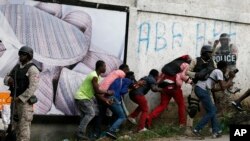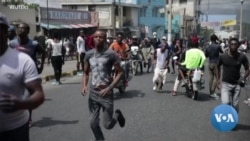Violent protests in which journalists were injured, attempts to intimidate or threaten reporters investigating wrongdoing, and the killing of a radio journalist have damaged Haiti’s press freedom credentials.
Haiti experienced the single largest decline for press freedom in the Reporters Without Borders 2020 Press Freedom Index.
"Despite recent changes in Haiti’s media freedom laws, journalists suffer from a lack of financial resources, an absence of institutional support and difficulty in accessing information," said the Paris-based rights group, which downgraded the country's score from 62 to 83 on a scale in which 1 is considered most free.
Faced with a series of natural disasters in recent years, damage to Haiti's already limited infrastructure triggered violent protests in which journalists were sometimes targeted.
The 2019 killing of journalist Néhémie Joseph of Radio Panic FM and the 2018 disappearance of freelance photojournalist Vladjimir Legagneur had already exacerbated the sense of risk for reporters.
"The privately owned media, which are heavily influenced by the interests of their owners, tend to censor themselves," the RSF report said.
Port-au-Prince-based reporter Edline Vernal, of Radio Télévision Pacifique, described day-to-day life for journalists as "a never-ending battle."
"After the Duvalier dictatorships, which ended in 1986, many efforts were made [to improve media rights in Haiti], but not much changed," she told VOA.
"The Haitian [reporter] has no access to training, [and] legislation pertaining to access to information has been sitting in parliament for several years now, but it has not been voted on," she said.
"Also, Haitian media in large part depend on private enterprise to generate advertising revenue, [which] in itself … is an obstacle to press freedom."
But some Haitian journalists, Vernal added, are undeterred, forming associations that devise strategies to improve the situation.
"They discuss strategies they can use to overcome these obstacles, but this remains a huge battle," she said. "Up to now, these efforts have not been successful. We’re constantly restarting our battle, over and over again, but without success. Also, journalists who criticize the government or who set out to investigate wrongdoing often face intimidation, violence, and at times they are even brutalized in public institutions."
Joseph was found with multiple gunshot wounds in the trunk of his car after covering political protests in late 2019. His family said he had received numerous death threats.
Freelance photojournalist Legagneur disappeared in March 2018 while working on a story in the slums of Port-au-Prince.
Both cases remain unsolved, according to data from the U.S.-based Committee to Protect Journalists (CPJ).
Journalists have also faced obstacles while reporting on the coronavirus pandemic.
In April, the CPJ called on Haitian authorities to investigate an assault on a group of journalists in Port-au-Prince.
CPJ reported that several unidentified men punched and hit a group of eight reporters at the National Identification Office, a government department that manages citizens’ identification cards.
The journalists were there to report on claims that the office was not adhering to guidelines on social distancing.
“Journalists should be free to cover COVID-19 and local authorities’ handling of the pandemic without fear that they will be assaulted,” said CPJ Central and South America Program Coordinator Natalie Southwick.
Officials at Haiti’s embassy in Washington did not immediately respond to VOA’s requests for comment in time for publication.
Reuters Port-au-Prince reporter Robenson Sanon likened coverage of the pandemic to being on the front lines of an armed conflict.
"I keep social distance, and I wear the masks and gloves,” he told CPJ. “But many of my colleagues don’t have protective equipment. And like soldiers in the battlefield, we are in the first line of battle."






